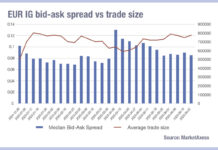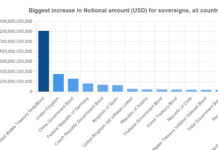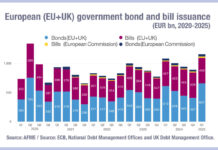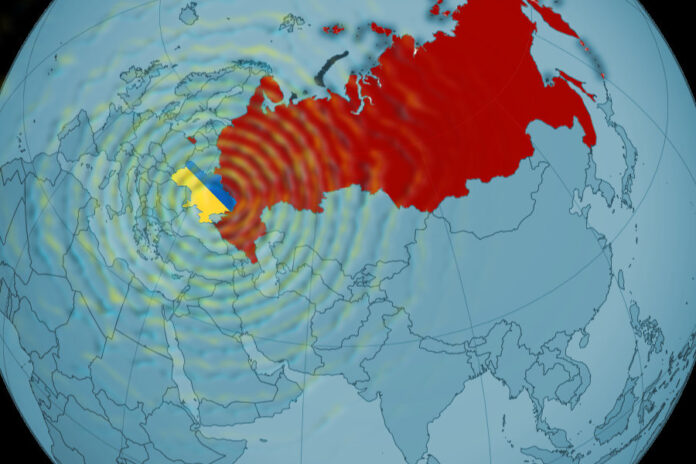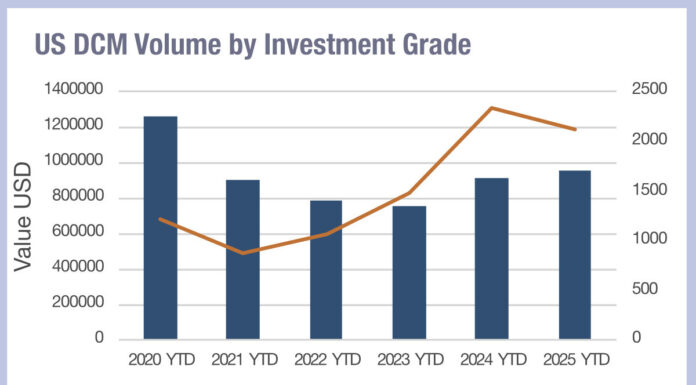Sanctions on the Russian regime, on associated firms and on individuals have restricted legal access to some instruments and counterparties, yet portfolio managers may still be moving out of, or buying into, positions in Russian-associated debt.
Clearly voice trading is one way to try and access pricing and liquidity, but with local markets inaccessible due to the suspension of contact between counterparties and some trading infrastructure, electronic trading is also a potential route.
Having spoken with major service providers in the data, communications, and trading arena it is clear that finding access to trading via electronic channels is complex as those firms try to manage a fluid and nuanced situation.
For example, rouble-denominated securities trading cannot be settled in some cases, dependent on the central securities depositary that is being used. For example, Euroclear and Clearstream no longer process rouble denominated trades.
ICE Data Pricing & Reference Data (PRD) has discontinued evaluations for all ruble-denominated securities since 8 March, but will continue providing evaluations of Russian bonds denominated in USD and EUR.
FTSE Russell, part of the London Stock Exchange Group (LSEG) has reported feedback indicating a complete inability for international investors to repatriate bond proceeds in ruble and non-ruble denominated assets from the Russian government and Russian bond-issuers creating total or near total lack of price discovery mechanisms for such securities, and subsequently announces that the Market Accessibility Level for local currency, fixed-rate Russian government bonds will change from “1” to “Unassigned”.
In some cases, data may still be provided but due to the classification or lack of input to support it, effectively be unusable for trading.
LSEG reported it is “suspending all new sales of products and services in Russia,” although “Data products will continue to be accessible by currently serviced customers.”
Based on a quick survey of major infrastructure providers in the fixed income space, the responses below give some indication of the level of services being offered at present in relation to Russian firms, non-Russian firms trading with Russian counterparties, and data offered relating to trading of Russian instruments.
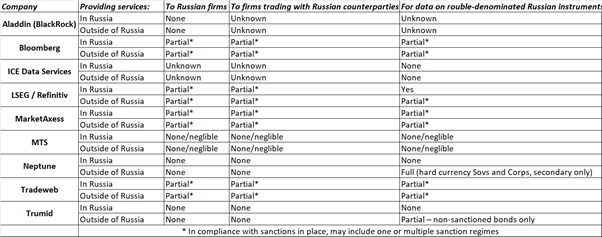
Platforms may have switched off trading for sanctioned instruments but not non-sanctioned instruments, likewise for sanctioned versus non-sanctioned trading entities.
A spokesperson for MarketAxess noted, “We have taken all necessary steps to ensure that we observe all applicable sanctions relevant to our business, and we continue to closely track updates to those sanctions. As such, we have limited the availability of Russian corporate and government bonds on the MarketAxess trading system.”
Sanctions regimes themselves vary across geographies, and include Russia barring access to media into the country, which can impact data and information services. They are also very changeable, with new sanctions announced daily. Companies may also make their own decisions about what actions should be taken.
A spokesperson for Bloomberg said, “As required by US, UK, and EU regulations, we have disabled relevant services for entities who are subject to sanctions, and blocked trading of instruments subject to sanctions. We are doing our part to ensure that sanctions are effectively implemented, while we do our best to meet the needs of our global customer community. We continue to monitor the situation closely and will consider further actions as circumstances warrant.”
Tradeweb’s spokesperson also noted that, “Tradeweb conducts ongoing sanctions screening with respect to its platforms. We have suspended trading of instruments and participants captured under the relevant Russian sanctions.”
©Markets Media Europe 2025

